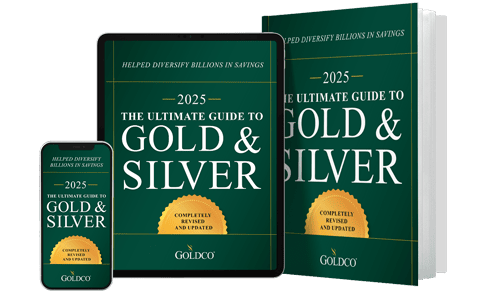
There’s no better way to accumulate wealth than by saving and investing. But just socking away money into a bank account isn’t going to grow your wealth by itself.
Growing your money means saving but also investing, putting the money you’ve saved to work for you. But many people don’t know how to do that, and don’t know which investment assets might best serve their financial goals and needs.
Stocks and bonds are popular traditional financial investments, although they are subject to a great deal of risk. Bond markets, for instance, have been thrown into disarray in recent years after the Federal Reserve’s rate hikes, and now the future movement of bond rates and prices is tough to predict.
Stocks, too, can be subject to major losses, as we saw in 2020. And with recession remaining a looming threat, there’s a real fear that stock markets could collapse during the next financial crisis.
That’s why many people choose to protect their financial well-being with precious metals like gold. Gold’s performance has actually outperformed that of the broader stock market thus far in the 21st century.
And if the next recession causes stocks to plummet while gold rises, gold’s performance in relationship to stock markets could become even greater. But for many investors, the question they have is: how do I buy gold?
For many people today, a 401(k) account is their primary investment vehicle. These employer-sponsored plans have become incredibly popular, and employees have invested trillions of dollars through them.
But if you invest through a 401(k) plan, you may have noticed that there’s not a “Buy Gold” option within your plan. Many 401(k) plans offer limited investment options, and gold often isn’t one of them.
However, that won’t stop dedicated investors who are determined to benefit from owning gold. With a little bit of thought and planning, you too can buy gold with your 401(k).

Your 401(k) Explained
401(k) plans are employer-sponsored retirement plans that offer employees the ability to contribute money from their paychecks before taxes into a retirement plan. Those funds are then invested and grow tax-free until the investor decides to or is required to take a distribution.
Because the money invested is taken out before taxes, that also reduces the employee’s taxable income, leading to lower income tax payments in the present. Many employers offer matching contributions up to a certain amount, with the average employer contributing about 4.8% of an employee’s salary.
Very often that’s free money on the table for employees to take advantage of, allowing them in some cases to double their annual 401(k) contributions. For 2024, the maximum amount employees can contribute to a 401(k) is $23,000, and the maximum total combined employer and employee contribution is $69,000.
If you only want to stick to investing in stocks and bonds, investing through a 401(k) plan can be a good choice, especially if your 401(k) plan offers a wide array of investment options. But if you only want to invest in gold, 401(k) plans often don’t offer the option of gold investments.
If you want to use your 401(k) assets to buy gold, starting a 401(k) plan can be a good first step before eventually buying gold. Then you can use your 401(k) assets to gain exposure to the gold market in a few different ways.
How to Buy Gold With Your 401(k)
There are three primary methods by which investors can gain exposure to gold with a 401(k). Those are through investing in gold funds, investing in gold ETFs, or rolling over 401(k) assets into a gold IRA.
1. Gold Funds
Some 401(k) plans offer their investors the opportunity to invest in precious metals funds. These funds often invest in the shares of gold mining companies.
The thinking is that if gold prices rise, mining companies will make more money and their share prices will increase. But that isn’t always the case, as rising costs of doing business, labor disputes, political instability, etc. may act as a drag on gold mining companies.
Some precious metals funds may offer additional exposure to precious metals through metal holdings or purchasing shares in gold exchange-traded funds (ETFs). While you’re not actually buying physical gold with a 401(k), you’re still gaining exposure to gold markets.
2. Gold ETFs
Occasionally, employees may find themselves investing in a 401(k) plan with a brokerage option. That enables them to invest their assets through a regular brokerage account while still maintaining the tax advantages of their 401(k) plan.
The advantage of a brokerage account is that it offers employees the ability to invest in a wider range of assets, such as gold ETFs. Gold ETFs are funds that purchase gold and then offer shares in their fund for sale to investors.
One of the major downsides to gold ETFs is that you’re not actually buying physical gold, nor can you convert your shares to physical gold. So again, while you can buy gold assets with your 401(k) assets through an ETF, you’re still not investing in physical gold, just in shares of a fund that holds physical gold.
3. Gold IRA
If you are dead set on buying physical gold with a 401(k), your best bet is a gold 401(k) to IRA rollover. A gold IRA rollover means that you roll over existing assets from a 401(k) plan into a new gold IRA.
That gold IRA becomes the investment vehicle that you use to purchase physical gold coins and bullion. These 401(k) to IRA rollovers occur tax-free in most cases, and there is no limit to the amount of money you can roll over.
The coins or bars that you decide to buy with your gold IRA are managed by a gold IRA custodian and are stored at a bullion depository. As with other IRA accounts, your gold IRA accrues gains tax-free, and taxes are only paid when you take a distribution.
Once you decide to take a distribution, you can take that distribution either in gold or in cash. And the same required minimum distribution (RMD) rules apply to gold IRAs as apply to all other IRAs.

Benefits of Owning Gold
Owning gold is a time-tested way to protect hard-earned assets against economic uncertainty and financial turmoil. If you’re worried about your tax-advantaged retirement savings losing value during an economic downturn, you keep those assets protected with a simple 401(k) to gold IRA rollover.
With gold having recently hit all-time highs and showing signs of continuing strong growth, now is the time to take advantage of gold’s potential. By buying physical gold through a gold 401(k) to IRA rollover, investors can take advantage of the fact that they’re investing in a tangible physical asset that has been in demand for centuries and will continue to be well into the future.
Investors who are worried about their 401(k) losing value can roll over their funds into a gold IRA tax-free, potentially sparing themselves massive losses in the event of a market crash. And with gold looking poised to continue gaining value in the future, gold offers the possibility of keeping your assets safe and secure.
Picking Your Best Option for Buying Gold With a 401(k)
Buying gold with a 401(k) to IRA rollover is not a difficult process, but it’s not something that many people are capable of doing on their own. While gold IRAs are subject to the same rules and regulations as other IRAs, there are issues specific to gold IRAs that can lead to unfortunate tax consequences if you don’t know what you’re doing.
That’s why working with trusted partners like Goldco throughout the gold IRA process can help ensure that your new gold IRA is set up properly and that you’re not accidentally subjecting yourself to potential taxes and penalties. Goldco works with experienced gold IRA custodians and bullion depositories to ensure that our customers’ gold assets are properly managed and protected.
The experts at Goldco have years of experience helping investors just like you buy gold with their 401(k) assets. So if you’re worried about your 401(k) losing value and want to explore whether you can buy gold with your 401(k), contact Goldco today to find out how you can benefit from owning physical gold.
This article was originally published in October 2019 and was updated in April 2024.








